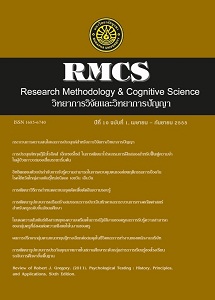ผลการศึกษากลุ่มตามแนวทฤษฎีทางเลือกต่อสมดุลในชีวิตและการทำงานของพนักงานบริษัท
Main Article Content
Abstract
The Effects of Choice Theory Group Counseling on the Work-Life Balance of Employees
Pachrarin Nipanthanon and Warakorn Subwiraprakorn
Burapha University, Thailand
The purpose of this research was to study the effects of Choice Theory Group Counseling on work-life balance of employees at an air conditioned manufacturing plant. The sample consisted of twelve employees who had the lowest scores on work-life balance scale. Participants were randomly assigned to experimental and control groups, with six members each. The experimental group participated in in counseling sessions two times per week over six weeks, with sessions lasting from 60 to 90 minutes. The instruments were work-life balance scale and the counseling program. The data collection procedure involved three phases: the pre-test, the post-test, and the follow-up. The data were analyzed by repeated-measure analysis of variance: one between-subjects and one within- subjects.
The results revealed that the interaction between the methods and the duration of the experimental was found statisfically significant at .05 level. Compared to pre-test scores, and to control group scores, employees in the experimental group demonstrated significantly higher work-life balance scores on both the post-test and the follow-up.

